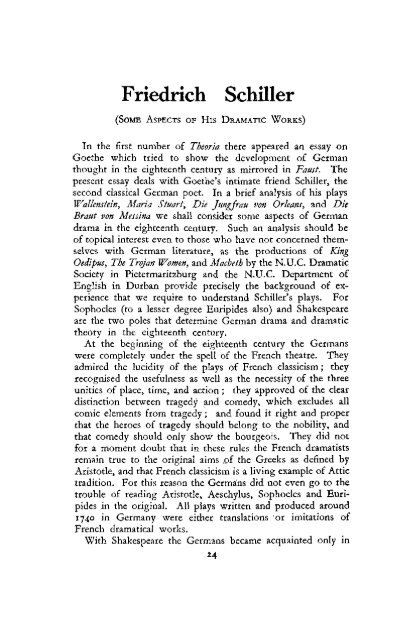Theoria - DISA
Theoria - DISA
Theoria - DISA
Create successful ePaper yourself
Turn your PDF publications into a flip-book with our unique Google optimized e-Paper software.
Friedrich Schiller<br />
(SOME ASPECTS OF HIS DRAMATIC WORKS)<br />
In the first number of <strong>Theoria</strong> there appeared an essay on<br />
Goethe which tried to show the development of German<br />
thought in the eighteenth century as mirrored in Faust. The<br />
present essay deals with Goethe's intimate friend Schiller, the<br />
second classical German poet. In a brief analysis of his plays<br />
Wallenstein, Maria Stuart, Die Jungfrau von Orleans, and Die<br />
Braut von Messina we shall consider some aspects of German<br />
drama in the eighteenth century. Such an analysis should be<br />
of topical interest even to those who have not concerned themselves<br />
with German literature, as the productions of King<br />
Oedipus, The Trojan Women, and Macbeth by the N.U.C. Dramatic<br />
Society in Pietermaritzburg and the N.U.C. Department of<br />
English in Durban provide precisely the background of experience<br />
that we require to understand Schiller's plays. For<br />
Sophocles (to a lesser degree Euripides also) and Shakespeare<br />
are the two poles that determine German drama and dramatic<br />
theory in the eighteenth century.<br />
At the beginning of the eighteenth century the Germans<br />
were completely under the spell of the French theatre. They<br />
admired the lucidity of the plays of French classicism; they<br />
recognised the usefulness as well as the necessity of the three<br />
unities of place, time, and action ; they approved of the clear<br />
distinction between tragedy and comedy, which excludes all<br />
comic elements from tragedy; and found it right and proper<br />
that the heroes of tragedy should belong to the nobility, and<br />
that comedy should only show the bourgeois. They did not<br />
for a moment doubt that in these rules the French dramatists<br />
remain true to the original aims ,pf the Greeks as defined by<br />
Aristotle, and that French classicism is a living example of Attic<br />
tradition. For this reason the Germans did not even go to the<br />
trouble of reading Aristotle, Aeschylus, Sophocles and Euripides<br />
in the original. All plays written and produced around<br />
1740 in Germany were either translations 'or imitations of<br />
French dramatical works.<br />
With Shakespeare the Germans became acquainted only in<br />
24
















